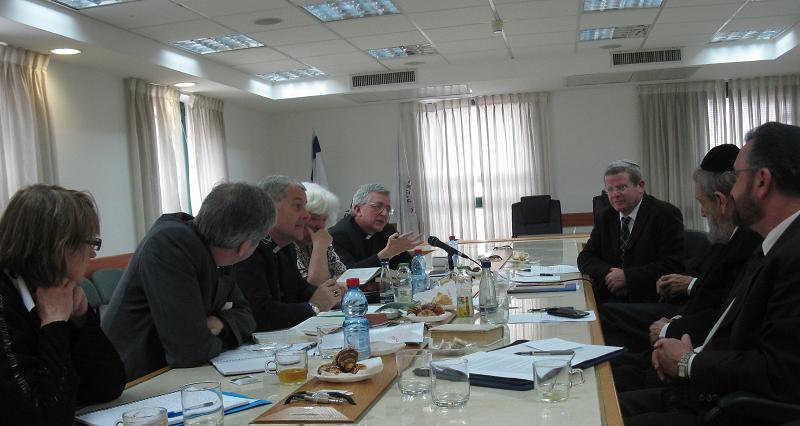News
Third meeting, Jerusalem 24th-25th March 2009
The Anglican Jewish Commission Of the Archbishop of Canterbury and the Chief
Rabbinate of Israel
Third meeting, Jerusalem 24th-25th March 2009
The third meeting of the Anglican Jewish Commission of the Archbishop of
Canterbury and the Chief Rabbinate of Israel took place at the offices of
the Chief Rabbinate of Israel on 24th and 25th March 2009. The Commission's
mandate is taken from the provisions of the joint declaration of the
Archbishop and the Chief Rabbis at Lambeth Palace on 6th September 2006 and
confirmed at their second meeting in Jerusalem on 31st October 2007.
The leaders of the Commission delegations, Chief Rabbi Shear Yashuv Cohen
of
Haifa and the Rt Revd Michael Jackson, Bishop of Clogher, recalled with
pleasure the previous meeting of the Commission and welcomed the
confirmation and renewal of friendship which this third meeting of the
Commission represents for Jewish Christian relationships.
The Anglican delegation regretted the unavoidable absence of Rabbi David
Brodman and wished him a speedy and full recovery.
The Commission's meeting in Jerusalem took place in the context of a number
of significant events including the tensions created as a result of recent
suffering in Gaza and southern Israel; the increase in anti semitic
incidents in Europe and elsewhere; and the forthcoming visit of Pope
Benedict to Israel. The Commission also coincided with the meeting of the
Council of the Religious Institutions of the Holy Land and the members of
the Commission were glad to be able to exchange greetings and discuss
matters of mutual interest in the context of a joint luncheon with Council
members.
The Commission members also appreciated the hospitality of the Director
of
the Department for Religious Affairs of the Ministry of Foreign Affairs,
Mr
Bahig Mansour, who briefed the delegations on the proposed arrangements for
the visit of Pope Benedict and other matters of interest including the
continued detention of Gilad Shalit beyond the conventions on the treatment
of prisoners.
The Anglican delegation enjoyed a tour of the Jewish Quarter led by Rabbi
Professor Daniel Sperber, including a visit to his home and library in the
heart of the old city.
At the opening session Chief Rabbi Shear Yashuv Cohen welcomed the Anglican
delegation to Jerusalem, a city of holy places for Jews, Christians and
Muslims. The Rt Revd Michael Jackson brought greetings from the Archbishop
of Canterbury and from the Rt Revd Suheil Dawani, Bishop in Jerusalem and
thanked the Chief Rabbinate for their hospitality
The theme of the Commission's meeting was 'Jerusalem' and papers were
presented by Rabbi Professor Daniel Sperber on behalf of the Jewish
delegation and by Mrs Clare Amos on behalf of the Anglican delegation.
Extensive discussions took place in a friendly and constructive atmosphere
on the many issues raised by the papers.
Both papers noted the conjoined terrestrial and celestial understandings
of
the significance of the city and the creative tensions between them and both
appreciated the implications of the theological and scriptural perspectives
for the present and future life of Jerusalem. In discussion it was noted
that Jerusalem is at the centre of historical and contemporary Jewish
identity and also the importance of understanding Jerusalem as a city to
be
shared between the religions, a house of prayer for all nations and a city
which should make all people friends beyond possessiveness. The peace of
Jerusalem for which Jews, Muslims and Christians pray should be such as to
be a light to all nations
In his paper, Rabbi Sperber spoke of the traditional understanding of the
degrees of sanctity emanating outwards from the heart of the temple, the
Holy of Holies extending outwards and represented in the mediaeval view of
Jerusalem as the navel of the world. The terrestrial Jerusalem is mystically
connected to the celestial Jerusalem and is the point from which all
creation expanded. The physical Jerusalem is thus a glimpse of the celestial
and is the place to which all prayer is oriented and though which all
prayers pass. He cited Nathan Sharansky's understanding of Jerusalem as
being the spiritual centre of gravity for all Jews and of the spark of
Jerusalem's sanctity in every Jewish soul.
Clare Amos in her paper took the vision of Jerusalem in the New Testament
book of Revelation as her starting point, and explored four key themes with
which Christians have engaged: The renewed or heavenly Jerusalem; Jerusalem
as the dwelling place of God; Jerusalem as the centre of the world;
Jerusalem as the rejecting and suffering one. She drew on material from the
Old and New Testaments, as well as Christian history and poetry. Her
presentation made it clear that cherishing Jerusalem was deeply embedded
in
the faith of many Christians, and that linked to that, Christians from other
parts of the world needed to have a special care for their Christian
brothers and sisters who lived in the region. She suggested that reflecting
on Jerusalem as a 'sacrament' allowed us both to hold an ideal vision before
our eyes, but also acknowledged that, for Christians, the present reality
was less than perfect.
The Commission members looked forward to the next meeting of the Archbishop
and the Chief Rabbis of Israel in Jerusalem and to the next meeting of the
Commission in London in 2010.
Chief Rabbi Shear Yashuv Cohen
The Rt Revd Michael Jackson

Delegation of the Chief Rabbinate of Israel Rabbi Shear Yashuv Cohen, Chief
Rabbi of Haifa Rabbi Professor Daniel Sperber, Bar Ilan University Rabbi
David Rosen, President IJCIC Mr Oded Wiener, Director General of the Chief
Rabbinate of Israel
Delegation of the Archbishop of Canterbury
The Rt Revd Michael Jackson, Bishop of Clogher Mrs Clare Amos, Director of
Theological Studies, Anglican Communion Dr Jane Clements, Consultant to the
Council of Christians and Jews The Ven Michael Ipgrave, Archdeacon of
Southwark Canon Guy Wilkinson, Archbishop of Canterbury's Secretary for
Inter Religious Affairs
Date: 9th April 2009